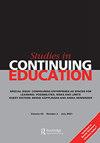退一步向前走:了解沟通技巧及其在工作场所的特点
IF 1.9
4区 教育学
Q2 EDUCATION & EDUCATIONAL RESEARCH
引用次数: 0
摘要
软技能在工作场所的重要性日益得到认可。此外,它们已被纳入国际教育和培训课程。然而,它们的概念化缺乏理论基础。本研究通过采用技能利用方法(而不是技能要求方法)和研究两个组织(Flow和Energy)的人力资源职能中的沟通技巧来填补这一空白。关键线人是理论上被抽样的事件的参与者(如雇员、候选人)。观察人力资源专业人员与对话者之间的互动,结合对话、访谈和组织文件,提供了数据语料库。该分析结合了扎根理论和语篇分析的关键机制。概念框架借鉴了情境学习。结果表明,沟通技巧不应被视为脱离语境的沟通行为。相反,沟通技巧需要不断调整和调整沟通行为(人们做什么)与以下三个因素:沟通遇到的目的,参与者的位置身份以及他们为实践带来的各种形式的认识。这种观点揭示了沟通技巧的试探性和难以捉摸性(而不是可转移性和普遍适用性)。这种以证据为导向的概念化对软技能应该如何研究、理解和发展/认可有影响。本文章由计算机程序翻译,如有差异,请以英文原文为准。
Taking a step back to move forward: understanding communication skills and their characteristics in the workplace
ABSTRACT Soft skills have been increasingly recognised as important in the workplace. They have been incorporated, moreover, in education and training curricula internationally. However, their conceptualisation lacks in theoretical grounding. This study fills this gap by taking a skills-utilisation approach (rather than a skills-requirements approach) and studying communication skills in the Human Resource function of two organisations, Flow and Energy. Key informants were participants in the events that were theoretically sampled (e.g. employees, candidates). Observations of interactions between HR professionals and their interlocutors, combined with conversations, interviews and organisational documents provided the data corpus. The analysis combined the key mechanics of grounded theory and discourse analysis. The conceptual framework drew on situated learning. Results indicate that communication skills should not be seen as decontextualised communication behaviours. Instead, communication skills require constant manoeuvring and alignment of communication behaviour (what people do) with the following three factors: the aim of the communication encounter, the actors’ positional identities and the various forms of knowing they bring to the practice. This view unveils the tentative and elusive (rather than transferrable and universally applicable) nature of communication skills. Such an evidence-driven conceptualisation has implications for how soft skills should be researched, understood and developed/accredited.
求助全文
通过发布文献求助,成功后即可免费获取论文全文。
去求助
来源期刊

Studies in Continuing Education
EDUCATION & EDUCATIONAL RESEARCH-
CiteScore
4.70
自引率
6.70%
发文量
22
期刊介绍:
Studies in Continuing Education is a scholarly journal concerned with all aspects of continuing, professional and lifelong learning. It aims to be of special interest to those involved in: •continuing professional education •adults learning •staff development •training and development •human resource development
 求助内容:
求助内容: 应助结果提醒方式:
应助结果提醒方式:


